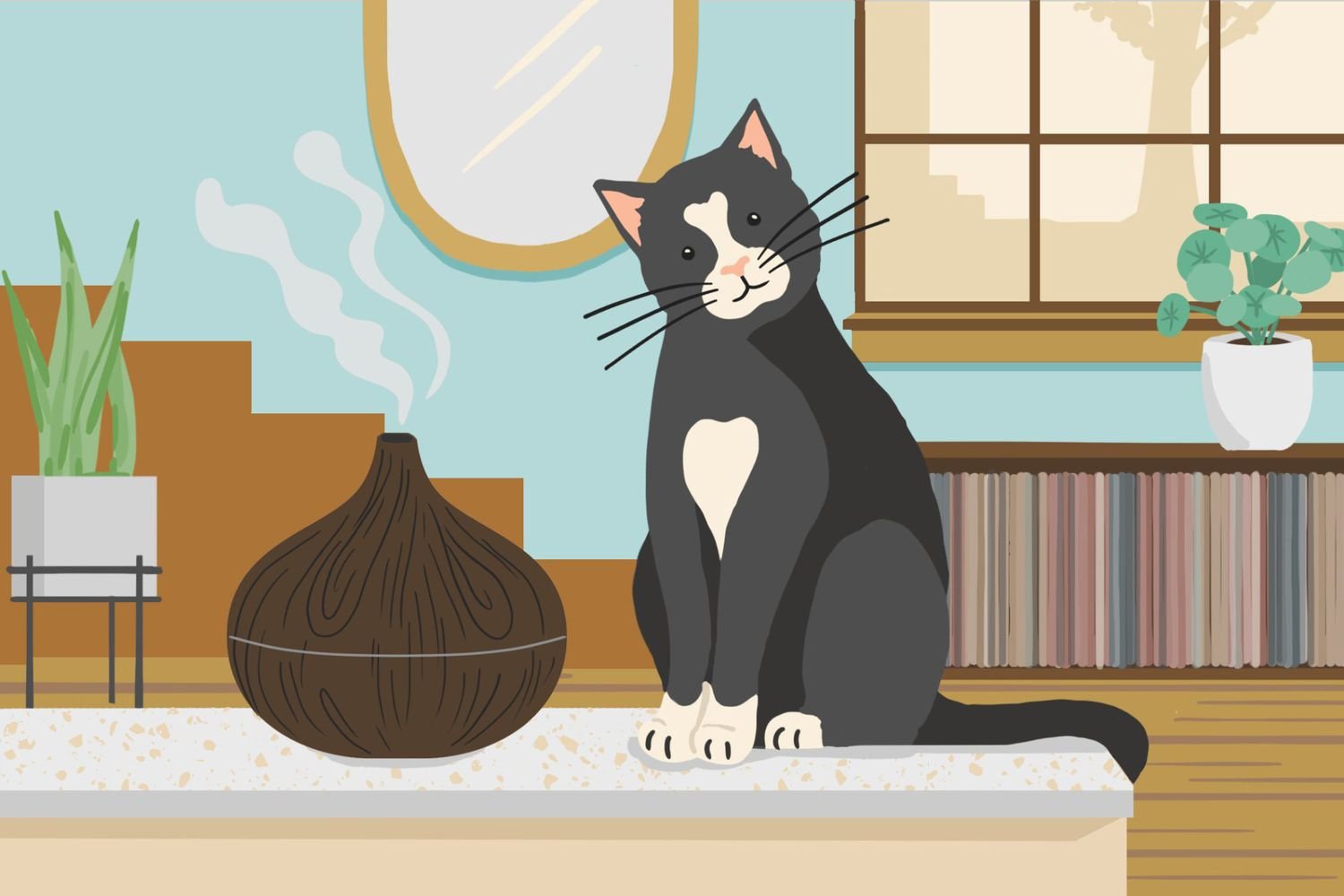Essential oils are made from the highly concentrated aromas of plants, herbs and flowers that are steamed or pressed to extract the “essence” from the plant. Essential oil enthusiasts say they have health benefits, including stress relief and energy/mood boosting effects. They are also sometimes used as digestive aids and pain relievers.
However, cat owners should use essential oils with caution, as they can be toxic to cats if ingested or exposed to them. This is especially true if you use a diffuser to diffuse the oils into your living space. Here, we explain what you need to know about using essential oils around cats, the potential risks, and which oils are particularly dangerous for cats.
Is it possible to safely diffuse essential oils around cats?
We asked veterinarian Tina Wismer, senior director of the ASPCA Animal Poison Control Center, for some expert advice to help pet owners learn how to use essential oils safely around cats. The No. 1 rule? Be careful.
“The best way to avoid exposing your pets to dangerous substances is to remain vigilant and ‘pet-proof’ your space,” Wismer says.
To help pet owners create a safe space where cats and essential oils can coexist, Wismer and the ASPCA Animal Poison Control Team offer the following guidelines to minimize risks to cats and other pets:
- Do not apply essential oils to cats, dogs or other animals. Because it’s hard to know exactly how diluted or concentrated an essential oil is, Wismer doesn’t recommend applying it to cats. “You definitely don’t want to apply it directly to your pet, because there’s so much variability in concentration and quality,” Wismer says.
- If your cat or other pet has underlying health issues, especially respiratory issues, avoid using an essential oil diffuser. Birds are especially susceptible to respiratory problems, so diffusers should not be used around birds.
- Keep essential oil bottles, diffusers, and warmers out of reach of cats.
- Allows cats and other animals to have access to a safe area away from fragrant essential oils. A cat’s sense of smell is not as sensitive as a dog’s, but it is still more sensitive than a human’s.
- Do not place the diffuser in a room where cats or other animals groom themselves. Diffusers and warmers release essential oils into the air, which then stick to your cat’s fur.
What are the risks of using essential oils around cats?
The main danger that essential oils pose to cats is respiratory irritation, which can cause a burning sensation in your cat’s nose and throat, coughing, wheezing, and difficulty breathing. If your cat is experiencing signs of difficulty breathing, Pet Poison Helpline advises moving your cat to fresh air as soon as possible. If symptoms don’t improve quickly, you should seek veterinary attention.
Wismer warns that cats may also be at higher risk for poisoning if they have underlying conditions such as asthma or allergies. The presence of essential oils in the air can make it hard for cats to breathe, so it’s best to avoid using diffusers or sprays that propel droplets into the air. But at-risk pets may also want to avoid using essential oils topically on cats, as they may have a hard time metabolizing the oils if they are absorbed into their skin or through a break in the skin. This is because cats lack a key enzyme that breaks down the phenols found in some oils.
In cases handled by the ASPCA Animal Poison Control, cats that have had skin contact with essential oils have experienced symptoms such as unsteadiness, muscle weakness, depression, behavioral changes, hypothermia, and loss of consciousness. Cats that have ingested essential oils have experienced vomiting, diarrhea, and slowed breathing and heart rates. Cats that inhale essential oils that are dispersed in the air may also develop pneumonia.
Which essential oils are dangerous for cats?
Certain essential oils are more dangerous to cats than others. Pennyroyal oil and Melaleuca (Tea Tree) oil have been reported to cause severe seizures and liver damage. Some oils, such as tea tree oil, are more toxic than others.
Other essential oils that may be particularly dangerous to cats if ingested or come into contact with the skin include cinnamon, citrus, peppermint, pine, sweet birch, wintergreen, and ylang-ylang.
If you suspect your cat has ingested these or any other essential oils or has received an essential oil on its skin, contact your veterinarian and bring the product packaging with you to the veterinary clinic. And as with any new ingredient you introduce into your cat’s environment, safety first. If you have any questions about what types of essential oils are safe to use around cats, contact your veterinarian.
Are essential oils good for your pet’s health?
Some companies tout the benefits of using essential oils as natural solutions to treat a variety of ailments in cats and dogs. Claims range from repelling fleas and mosquitoes from your home with oils like citronella and lavender to calming animals with chamomile essence, but the jury is still out on how effective these products really are. And many of these “helpful” essential oils are also on lists of essential oils to avoid if you have cats.
Additionally, while natural solutions such as essential oils can help get rid of the occasional flea infestation, most veterinarians agree that the best prevention to keep your pet safe from fleas and other parasites is a monthly preventative treatment that focuses on specific flea control.
Essential oils pose a bigger problem for cats than for dogs due to their larger size, sensitive skin, and tendency to be fastidious about grooming, so just because your vet has approved the use of a particular essential oil around dogs doesn’t mean the same rules apply to cats. As with any new substance, it’s best to check with your vet before using anything on or near your cat.

